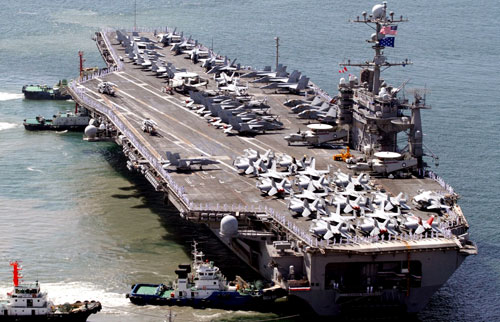
’What the disaster victims need urgently are food, water and medical attention, not US warships bringing in emergency rations to justify their armed presence in Philippine sovereign waters… If the US government were really interested in providing assistance to countries who have suffered from calamities, then it should increase its funds to civilian agencies that deal in disaster response and emergency relief, not in fattening its international military forces and taking advantage of the people’s miseries to justify their presence.’
Communist Party of the Philippines, 15 November 2013.
On 8 November, Typhoon Haiyan, known locally as Yolanda, hit the Philippines. The second-deadliest typhoon to have hit the country, it has left up to 10,000 people dead and thousands more injured. Total damage to infrastructure is estimated at up to $240m or more according to the National Disaster Risk Reduction & Management Council.
Following the disaster, the US announced that it was sending six warships to the Philippines, including the flagship aircraft carrier USS George Washington, which has 80 fighter jets as well as helicopter gun-ships, and more than 5,000 armed personnel. Another 1,000 soldiers have been sent, bringing the number of US soldiers in the Philippines to 10,000. The British sent HMS Daring and a Boeing C-17 military transport plane. Japan made commitments to send 1,000 military personnel, aircraft and three naval vessels to the country, in what could be its biggest overseas deployment since World War Two.
Tacloban airport, at the centre of the damage, was taken over by the US military. The US also took advantage of the disaster to gain access to the Mactan airport and seaport. These are facilities which have been part of negotiations for years with the US seeking to increase its military presence in the Philippines.
All this is occurring in a context where the US is accelerating its ‘pivot to Asia’, a US imperialist strategy to secure regional dominance in East Asia and the Pacific and to curb the growth and influence of China. By 2020, 60% of US naval forces are to be stationed in the region. The Philippines has been participating in joint military manoeuvres with the US and the US has increased its military aid to the Philippines, growing from $11.9m in 2011 to $30m in 2012. 2012 also saw the re-opening of the Clark Air Base and the Subic Naval Base to the US military, following conflict between the Philippines and China over the hotly disputed South China Sea. Continued disputes over the Spratly Islands, encouraged by the US, have been used by the Aquino regime to justify the further build-up of US forces in the country.
Lessons from Haiti.
While the imperialist media hail the large roll out of aid, there are warnings from the past. After the earthquake that hit Haiti in 2010, $8.4bn was announced as pledges for the reconstruction of the country. However, the reconstruction plans prioritised private enterprise and did little to address the need to house the 1.5 million people left homeless by the earthquake. Much of the money was never intended to arrive, with inflated and never-to-be received pledges and a large amount of the money promised being repackaged debt relief. Much of the money offered to Haiti never arrived but went to firms and institutions at home, with the US military and US private contractors being the biggest recipients. Of the $2.43bn in aid disbursed in 2010, only $24m went to the Haitian government – most was looted by imperialist corporations and the US military. In Haiti the US army took over Port-au-Prince airport, giving itself control over the arrival of aid.
This is the likely scenario for aid pledged to the Philippines. Instead of helping people to recover from the disaster, many of the donations will find their way into the profits of the imperialist corporations. It is multinational companies whose rampant, uncontrolled logging and mining operations are increasing the misery caused by natural disasters. The process of destructive extractive mining causes degradation and denudation of mountains and increases the number of landslides, and it has been stated that decades of mining and logging were one of the main causes for the 2006 Southern Leyte mudslides in the Philippines, killing over 1,120 people.
The further militarisation of the Philippines and the Asia-Pacific region offers no hope to the people whose lives were devastated by the typhoon and other natural disasters. Many thousands of people have donated to help the victims of the typhoon; their sentiments are abused by calculating and cynical governments and their armies.
Victoria Smith




